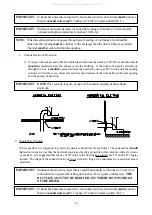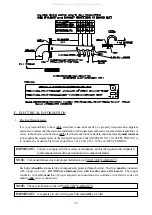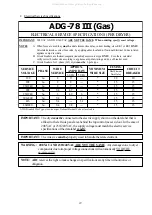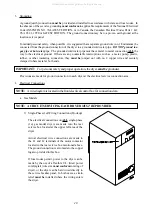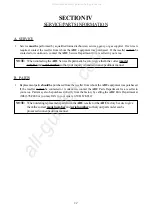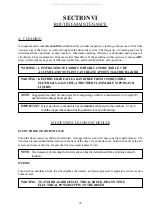
20
3. Grounding
A ground (earth) connection
must be
provided and installed in accordance with state and local codes. In
the absence of these codes, grounding
must conform
to applicable requirements of the National Electrical
Code ANSI/NFPA NO. 70-LATEST EDITION, or in Canada, the Canadian Electrical Codes Parts 1 & 2
CSA C22.1-1990 or LATEST EDITION. The ground connection may be to a proven earth ground at the
location service panel.
For added personal safety, when possible, it is suggested that a separate ground wire (no. 18 minimum) be
connected from the ground connection of the dryer to a grounded cold water pipe.
DO NOT ground to a
gas pipe or hot water pipe
. The grounded cold water pipe must have metal to metal connection
ALL
the
way to the electrical ground. If there are any nonmetallic interruptions, such as, a meter, pump, plastic,
rubber, or other insulating connectors, they
must be
jumped out with no. 4 copper wire and securely
clamped to bare metal at both ends.
IMPORTANT:
For personal safety and proper operation, the dryer
must be
grounded.
Provisions are made for ground connection in each dryer at the electrical service connection area.
4. Electrical Connections
NOTE:
A wire diagram is located in the front electrical control box for connection data.
a. Gas Models
NOTE: A CIRCUIT SERVICING EACH DRYER
MUST BE
PROVIDED
.
1) Single-Phase (1ø) Wiring Connections (Hookup)
The electrical connections on
ALL
single-phase
(1ø) gas model dryers are made into the rear
service box located at the upper left area of the
dryer.
Actual electrical wire connections are made to
the L1 and L2 terminals of the motor contactor
located in the rear service box mentioned above.
The ground connection is also made to the copper
lug also provided in this box.
If local codes permit, power to the dryer can be
made by the use of a flexible U.L. listed power
cord/pigtail (wire size
must conform
to rating of
dryer), or the dryer can be hard wired directly to
the service breaker panel. In both cases, a strain
relief
must be
installed where the wiring enters
the dryer.
All manuals and user guides at all-guides.com











